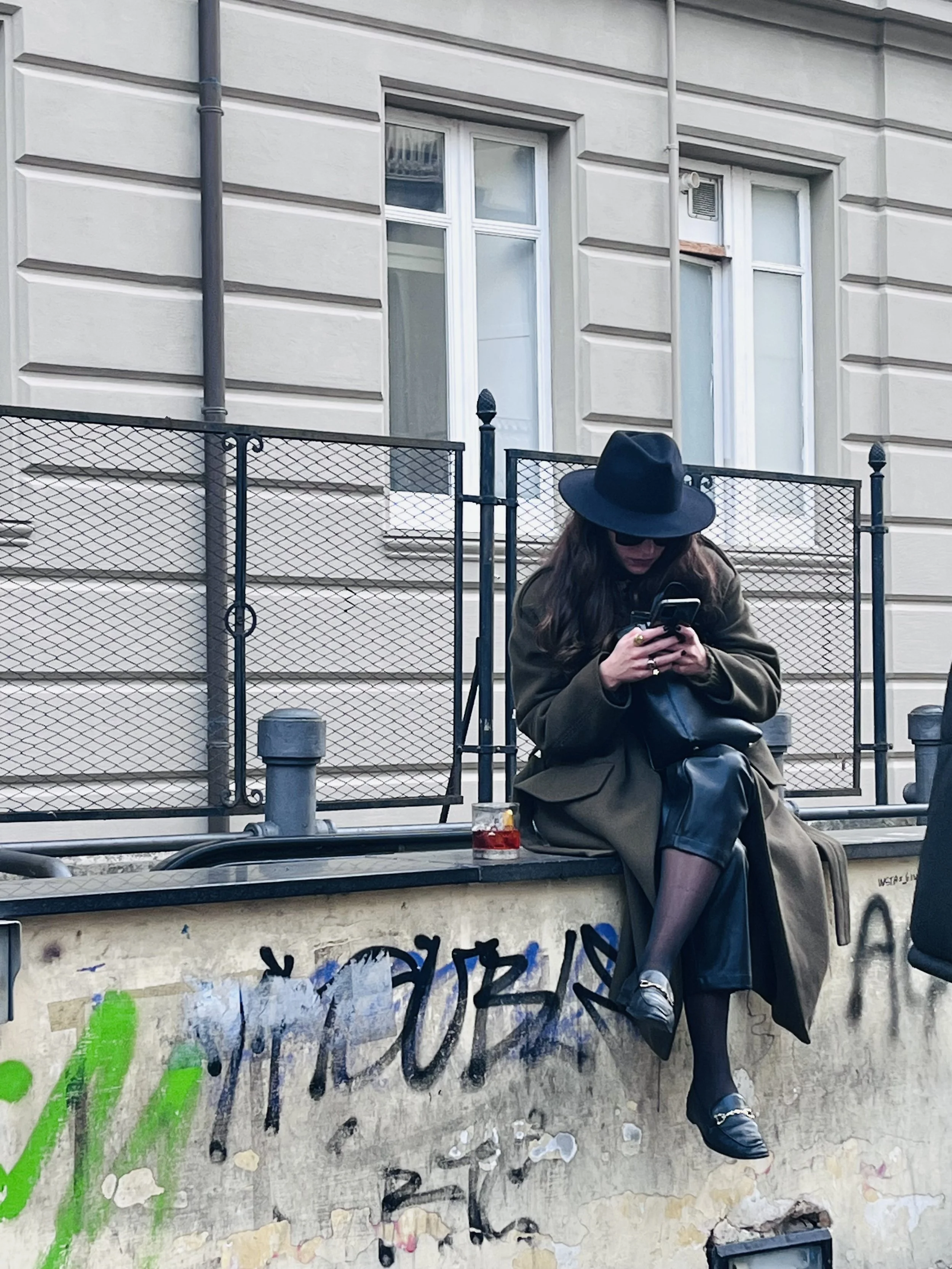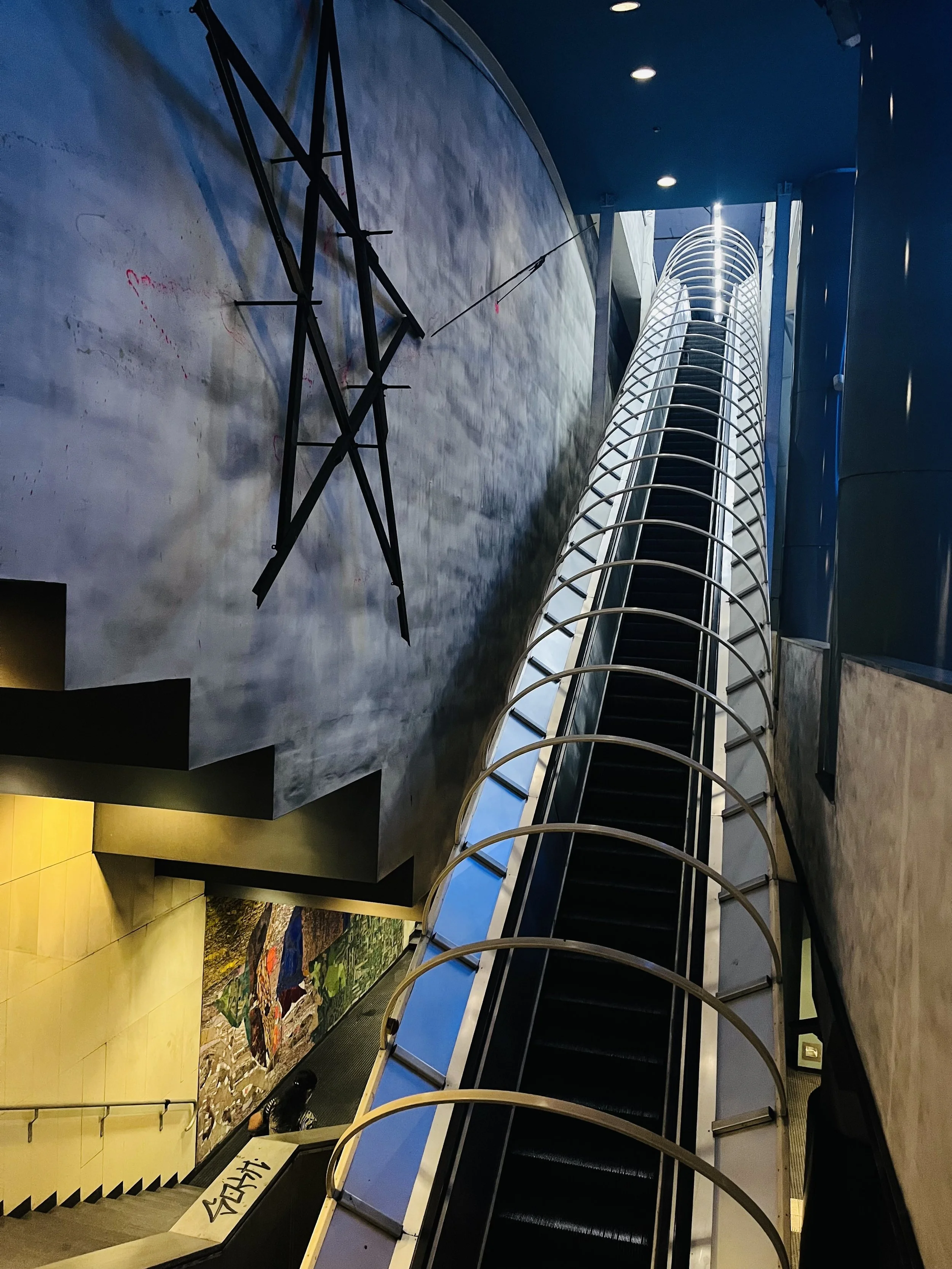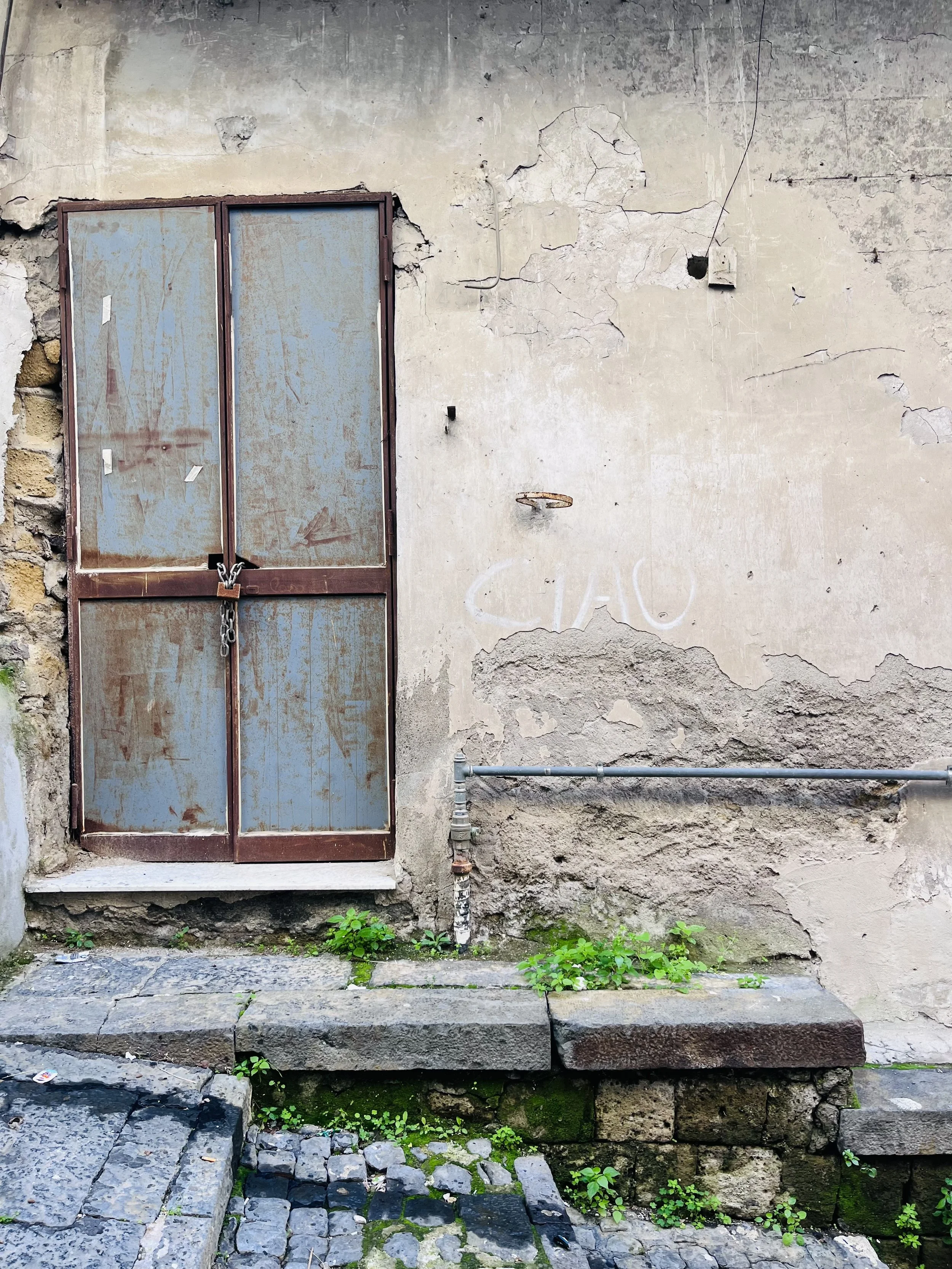Naples is a beast, a beauty, a theatrical mystery with neighborhoods full of drama, history, and mystery. On the hill above Chaia overlooking the picturesque Posillipo is the affluent Vomerò where I stayed in an ancient church cave that a young fisherman converted into an Airbnb. Traveling inspires our inner voyager, so first, to get there, I walked down the famous Via Toledo where French writer Stendhal wrote the famous words: “to me, this is the most beautiful city in the world.” Behind palm trees, the facade of the funicular rose tall and pink, and who doesn’t want to take a cable car built in the early twentieth century? If “funiculì funiculà is coming into your head; a journalist wrote that classic Italian song when the first funicular railway opened on Mount Vesuvius in 1880.
The architecture is worth the trip to Naples, one of the oldest continuously inhabited cities on Earth, but Vomerò, in particular, offers a stunning display of Neapolitan Liberty which the last station stop features in pink glass. Out of the funicular station, I hung a left and curved along an architectural heaven over rolling hills—Liberty in all its facets and shades—with spectacular views. Tip one if you’re staying in Vomerò: just walk around. Take Via Luigia Sanfelice and Via Fillippo Palizzi. You’ll see a flourishing graffiti: “maybe we’re crazy,” to turn left and see a Liberty mansion in orange gold across the street from a grey castello. Continuing on Sanfelice, however, I had to get to my Airbnb first. I passed the Villa Santarella where Baroque composer Domenico Scarlatti lived and worked. The castle grey and pink—a classic Neapolitan color combination—was constructed in 1909 in the Liberty and also Renaissance revival style, somehow, but Naples can be patchwork that gives the city its flavor. Right beside it, I found a villa behind a gate that could have come out of a novel.
A young strapping fisherman was waiting for me at the end of the block next to a sweet graffiti of the word “bird” on the side of a light pink building. Down a set of steps, we reached another skinny and steep set as if we had arrived at some tiny hilltop town and made our way down to his cave. Over the stone wall across the sea was the island of Capri, a tiled portrait in blue and yellow marked the spot in front of his front door with four windows.
The arched raised loft was his fisherman spot with a dark blue SMEG fridge and nautical decor. Though he had an ashtray from Grand Hotel Vesuvio—the most famous if not expensive lodgings in Naples—his place was simple and well-done, but I liked that little touch. He came from a family of fishermen and bought this little gem a couple of years ago and treated me like royalty but he was laidback—he even offered me a private driver…his friend.
I passed the funicular station and headed up some steps next to an escalator with fashionable Neapolitans in leather and hats hanging out between handsome buildings and graffiti. At the corner of a grey apartment building with wooden shutters, the terrace of fonoteca was packed; a stylish bar that sells craft cocktails and records! I got a Negroni, a classic, and perused some jackets with a cool, fun crowd. A friend of the fisherman had a citrusy drink in a tall glass with fresh mint in it. As a solo traveler, I never feel alone in Naples, because the city lives outside and Neapolitans are warm, boisterous, and prone to strike up a conversation.
Up the street, I found Cantina La Barbera, a secluded restaurant tucked down an alleyway with an enclosed outdoor terrace, woodsy. A large table conversed with voices that cocooned me in a warm embrace. The owner welcomed me as if I were a special guest if not home. He took his seat at a table with the restaurant musician was there who plays Thursdays. And Naples is a music capital, so I’dgo back to check out a local musician. I had a fagioli and meatball soup with rosemary followed by a zucca risotto thick and creamy with tartufo and fungi. Excited to explore the interior, the staff led me through the dining rooms with bright colors on the walls, empty at this time of day. They have a pizzeria downstairs in a tavern with archways, and Naples unfolds like a story; always a surprise or a delight to discover. “Come back,” they said. “Oh, most definitely,” I said. I admired the restaurant’s hot red emblem in the window of the facade on my way out.
The street with bustling bars curved toward an apartment building with a yellow facade dramatic in direct sunlight while the street remained in shadow at the end of the day. Naples is a city of contrasts. Every traveler has their style; I love finding a neighborhood that I can explore that also offers me sites to see and good drinks and eats!
Here are a few of spots to check out in Vomerò—to start
Castel Sant’Elmo
Everyone goes to Egg Castle on the lungomare, the seafront promenade, but I send travelers to this 14th-century fortress situated on the highest point in the city for sprawling views of the city, sea, and Vesuvius. (He’s always there.) A small novecento museum gives you a taste of modern Neapolitan art from 1910 to 1980 in the futurist and neorealism styles. There’s a Scaturchio at the Castel as well, a pastry shop famous for making sfogliatelle for over two hundred years. It’s a small seashell of a thousand crunches stuffed with ricotta, cinnamon, and candied citrus peel that is purported to be packed with potassium and other nutrients. You have to get this delectable treat if you’re in Naples—it’s a must. Most people crowd the location in centro storico and it doesn’t offer these breathtaking views in clear chairs. If you’re feeling indulgent, the cafe crema is dessert in a plastic goblet; a cold, thick, creamy shake for hot days that you can take to go.
Certosa di San Martino
A grand monasterial complex stands right beside Castel Sant’ Elmo as a premier example of Baroque architecture. Erected in 1325, the grounds are palatial with a hundred rooms, two churches, a majestic courtyard, four chapels, three cloisters, gothic dungeons, and hanging gardens. Make sure to allot half a day, at least. The royal chapel of the Treasure of San Gennaro is considered to be one of the finest artistic achievements of the city with a dome covered in paintings. And why not? You went from twentieth-century art at Castel Sant’Elmo to seventeenth-century Neapolitan painting.
Villa Floridiana
Take a coffee or a Spritz to go—porta via—and stroll through a park that was once the grounds of a royal villa that is now a ceramics museum. Under oaks, pines, palms, boxwoods, and through camelia roses and English meadows, the grounds are romantic with artificial ruins, statutes, enclosures, caves, and a small lake with caretta turtles. The neoclassical decorative arts museum houses gorgeous ceramics from the twelfth to ninetieth centuries that even include styles such as Chinese Ming, Qing, and Japanese Edo.
Vanvitelli Metro Stop
The Vomerò metro stop is on the best line in the city—the yellow number one—because it became a public art project. Every stop is a work of art filled with colors, mosaics, installations, and photographs. Among the hundreds of artists that are featured in this spectacular underground theatrical event are William Kentridge, Robert Wilson (Toledo), and Sol LeWitt. The city spent five billion dollars to introduce the city to contemporary art. I tend to take a trip through the subway early in the morning to avoid people entirely. At the Vanvitelli stop, black and white photographs of the architecture cover the walls with escalators ascending and descending through futuristic metal cages with a hot blue swirling lighting fixture in the ceiling.
Naples inspires stories though it’s packed already with myth, folklore, devil sightings (ha—it’s true!), and unbelievable true tales, so it sparks one’s creativity no matter if you lean toward the dark or light. A telephone rang in the space from the television screens on the platform below; a psychological play took off in my head, even a breakout absurd dance number of an almost 50s diner feel. I cannot recommend doing Line One enough, and the metro takes you straight to Garibaldi, too, so it’s a direct line to the train station.
Vomerò makes public transportation fun because driving in Naples is next to impossible. In the words of my cousin Carmine, “It is to be avoided at all costs.” I wouldn’t recommend it. Walking in Naples, in my opinion, is a feast for the eyes, especially from Vomerò; there are pedestrian pathways winding down to Chaia, another chic area to check out. Through archways, you’ll feel like you’re on a secret passageway in some tiny hillside town, once again, and arrive at buildings that will stop you in your tracks in the Liberty style behind palm trees. In the morning and afternoon, the play between the light and the city is a true marvel. Though it’s a healthy walk, you can make your way to Via Toledo and Place Plebiscito and take the funicular back. Avoid the path at night on the return. It’s uphill and not well-lit and Naples is enchanted; that includes the light and dark, so keep that in mind, though I did it and it was fine. Around my fisherman’s cave on Via Petraio, I explored some of these stone alleyways with light splitting through archways.
Naples is an adventure, and every neighborhood has a special character. Vomerò is an unforgettable gem, the perfect place to pick to discover Naples for a short trip or long stay also for its proximity to Posillipo; my favorite neighborhood. Prepare to wander through an architectural delight and fall in love—you’ll see the word over and over again across walls: amore. It’s public knowledge; it’s all about love, and as it was written on a box of panettone: whatever you do in life, put your heart into it.
I love you more than Maradona,
Maria













